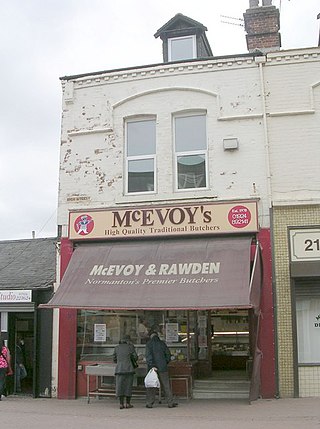McPherson is a Scottish surname. It is an Anglicised form of the Gaelic Mac a' Phearsain and Mac a Phearsoin, meaning "son of the parson". Notable people with the surname include:
McKinnon, MacKinnon or Mackinnon is a Scottish surname.,
Mac Diarmada, also spelled Mac Diarmata, is an Irish surname, and the surname of the ruling dynasty of Moylurg, a kingdom that existed in Connacht from the 10th to 16th centuries. The last ruling king was Tadhg mac Diarmata, who ruled until 1585.
McDuffie or MacDuffie is a surname of Scottish and Irish origin. McDuffie/MacDuffie is an Anglicization of the Gaelic Mac Duibhshíthe. The Gaelic name is composed of two elements; dubh ("black") + síth ("peace"). The name is sometimes shortened to McPhee or McFee. Notable people with the surname include:
McArdle or MacArdle is an Irish surname. It originates in County Monaghan, where it was the fifth most common surname in 1970. The surname in Irish is MacArdghail, from ardghal, meaning 'high valour' or from the Irish "ardghail" meaning "tall foreigner" with roots "ard" meaning "tall" and "gail" meaning "foreigner", indicative of their original ancestor being a Viking or from Viking stock. The surname is also common in County Armagh and County Louth.
McManus is an Irish surname. It is derived from the Irish Gaelic "Mac Mághnais", in modern Irish "McMaghnuis" which means "Son of Magnus". Its earlier origin is from the Latin "magnus", meaning "great". The Normans used it to honour Charlemagne (742–814), as Carolus Magnus. Variant spellings of the name include MacManus, Manus and MacManners. The English form, Moyne, is also found in Ulster. In Scotland it is a sept of Clan Colquhoun.
McCaffrey, sometimes spelled Caffrey or McCaffery, is an Irish surname. It is found mostly in the Counties Fermanagh, Monaghan, Cavan and Tyrone in the north west of Ireland. Ballymccaffrey is a townland outside Tempo in county Fermanagh. The surname is an Anglicised form of the Gaelic names Mac Gafraidh, Mac Gofraidh, which mean "son of Gafraidh", "son of Gofraidh". The Gaelic names are forms of the Old Norse Guðfróðr. Notable people with the surname include:
McQuillan and MacQuillan are surnames of Irish origin. There are several unrelated origins of the surnames McQuillan and MacQuillan.
McAuliffe or MacAuliffe is a surname of Norse Irish origin. The name is an Anglicisation of the Gaelic Mac Amhlaoibh, meaning "son of Amhlaoibh". The Gaelic name, Amhlaoibh, was derived from the Old Norse personal name Olaf. The surname occurs frequently in Munster, especially northern County Cork, western County Limerick, and eastern County Kerry. The McAuliffes were a sept, related to the McCarthys.
McCready is an Irish and Scottish surname. It is the Anglicized form of Gaelic Mac Riada "son of Riada", a personal name meaning "trained" and "expert". McCready is a variant of McCreadie; other variants are MacCready and McCredie.
McNeal is a surname. Notable people with the surname include:
McAdams or MacAdams is a surname of Scottish origin. It may refer to:
McElwain or McElwaine is a surname of Gaelic origin. It can be derived from either Scottish or Irish. The Scottish translation being the anglicized form of Gaelic Mac Gille Bheathain, meaning ‘son of the servant of (Saint) Beathan’ and also a personal name representing a diminutive of beatha ‘life’. The Irish form being the anglicised form of Gaelic Mac Giolla Bháin, meaning ‘son of the white-haired lad’. In Ulster this surname can be derived to be the Scottish form as opposed to the Irish form which would be more common in the Republic of Ireland. Another anglicised version of the Irish "Mac Giolla Bháin" is the surname Kilbane.
McVeigh is a surname of Scottish and Irish origin from Gaelic Mac Bheatha or Mac an Bheatha, and a bearer of Mac Beatha is mentioned in the Annals as taking part in the battle of Clontarf in 1014. The name is common in east Ulster, particularly Armagh. Variations include MacVay, MacVey, McVeagh. Notable people with the surname include:

McEvoy is an Irish surname. It is closely related to the name McAvoy and with the placename Clandeboye, an anglicised version of Clann Fhiodhbhuidge. The name translates as either "son of the fair-haired lad" or "son of the woodsman", depending on the original Gaelic version referred to.
McKinnie is a surname. Notable people with the surname include:
McMenamin is an Irish surname. In Gaelic it is rendered, Mac Meanman, meaning 'son of Meanma' a name meaning courageous or high spirited. It originated in County Donegal in the 13th century. The first written mention of the name is in 1303 in the 'Annals of Loch Cé' which records the deaths of Donnchadh Mac Meanman and Aedh Mac Meanman, grandsons of the Lector O'Domnhaill, the chieftain of Fanad, during a dynastic struggle within the Cenél Conaill. The McMenamins are a branch of the O'Donnells of Tyrconnell (Donegal) and are part of the Sil Lugdach, descendants of Lugaid mac Sétnai, the great-grandson of Conall Gulban. Like many discarded branches of noble families, the McMenamins sought advancement in the church evidenced by numerous mentions of McMenamin prelates in papal letters from the late 1300s to the late 1400s. They were supplanted in their home territory of Fanad by the Sweeneys and over the centuries became more distantly related to the royal line of the Cenél Conaill. One scholar describes the family as "...a discarded branch of the O'Donnell dynasty"
McAdam, MacAdam or Macadam is a Scottish Gaelic clan which originated as a branch of Clan Gregor. As a surname it is most prominent in the Galloway and Ayrshire regions of Scotland. Some of their descendants are also to be found in Ireland, the United States, Australia and Canada.
This page is based on this
Wikipedia article Text is available under the
CC BY-SA 4.0 license; additional terms may apply.
Images, videos and audio are available under their respective licenses.
